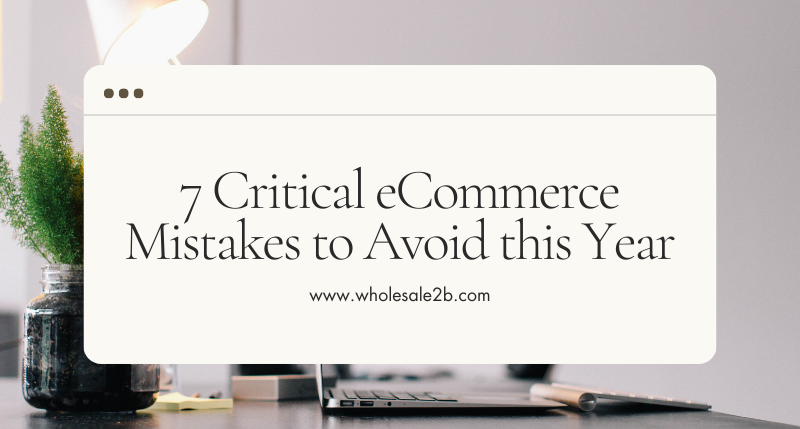
7 Critical eCommerce Mistakes to Avoid in 2024
From my experience, selling products online has become more popular by each day. However, running a successful eCommerce store requires more than just setting up a website and listing your products.
There are several common mistakes that many online sellers make, which can hinder their success and profitability. Let’s discuss the top critical eCommerce mistakes to avoid when selling online and provide actionable tips to help you overcome these challenges.
1. Lack of Market Research
One of the biggest mistakes that online sellers make is diving into eCommerce without conducting proper market research. Understanding your target audience and their needs is crucial for the success of your online store.
By conducting market research, you can identify the demand for your product, determine your target audience, and tailor your marketing efforts accordingly.
To conduct effective market research, use various online resources such as Google searches, social media groups, forums, and customer reviews. These “fishing holes” can provide valuable insights into your target audience’s preferences, pain points, and expectations.
By listening to customer feedback, you can refine your product offerings and marketing strategies to better meet their needs, ultimately improving your conversion rates and customer satisfaction.
2. Choosing the Wrong eCommerce Platform
Selecting the right eCommerce platform is crucial for the growth and success of your online store. There are numerous eCommerce platforms available, each offering different features and functionalities.
It’s essential to choose a platform that aligns with your business goals and provides the necessary tools to support your operations.
When choosing an eCommerce platform, consider factors such as ease of use, scalability, customization options, and integration capabilities. Conduct thorough research, read reviews, and seek recommendations from other store owners to make an informed decision.
Remember that your eCommerce platform should be flexible enough to grow with your business and meet the changing needs of your customers.
3. Poor User Experience (UX/UI) Design
A poor user experience can significantly impact your online store’s success. Customers expect a seamless and intuitive shopping experience, and any friction or inconvenience can lead to cart abandonment and lost sales.
It’s crucial to prioritize user experience design to create a website that is easy to navigate and visually appealing. Start by ensuring that your website has a user-friendly interface, with clear and intuitive navigation menus.
Organize your products into logical categories and use search functionality to help customers find what they’re looking for quickly. Invest in high-quality product images that showcase your offerings from multiple angles and provide detailed descriptions that highlight the unique selling points of each product.
Additionally, optimize your website for speed and mobile responsiveness, as more and more customers are shopping on their mobile devices.
A responsive design ensures that your website looks and functions seamlessly across different devices, improving the overall user experience.
4. Ignoring SEO Optimization
Search engine optimization (SEO) is crucial for driving organic traffic to your online store. Ignoring SEO optimization can result in your website not ranking well in search engine results, making it difficult for potential customers to find you.
To improve your SEO, focus on optimizing your website’s content, metadata, and structure.
Start by conducting keyword research to identify the search terms that your target audience is using. Incorporate these keywords naturally into your website’s content, including product descriptions, blog posts, and category pages.
Optimize your metadata, including title tags and meta descriptions, to provide clear and concise information that entices users to click on your website in search results.
Additionally, focus on building high-quality backlinks from reputable websites in your industry. This can help improve your website’s authority and visibility in search engine rankings.
Regularly monitor your website’s SEO performance and make adjustments as needed to ensure that you are maximizing your organic search traffic.
5. Inadequate Talent Management
As your online store grows, it’s essential to build a team that can support and manage your operations effectively. Many online sellers make the mistake of not investing in talent management, which can lead to inefficiencies and hinder growth.
Take the time to recruit and hire individuals who are not only skilled but also align with your company’s values and culture.
Consider outsourcing certain tasks or hiring freelancers for specialized services to ensure that you have the expertise you need to succeed.
Effective talent management involves providing ongoing training and development opportunities for your team members.
This helps them stay up-to-date with industry trends and best practices, enabling them to contribute more effectively to your online store’s success.
6. Neglecting Customer Requests
Customer satisfaction is paramount in eCommerce. Neglecting customer requests or failing to provide timely and helpful support can result in negative reviews, decreased customer loyalty, and lost sales.
Make it a priority to respond promptly to customer inquiries and provide excellent customer service. Monitor your website’s comments, emails, and social media channels to address any questions or concerns that customers may have.
Consider implementing a robust customer support system, such as a live chat function or a dedicated customer service team, to ensure that customers receive the assistance they need.
Additionally, actively seek feedback from your customers and use it to improve your products and services. By listening to your customers’ needs and incorporating their suggestions, you can build strong relationships and create a positive reputation for your online store.
7. Neglecting Branding
Branding plays a crucial role in differentiating your online store from competitors and building customer trust and loyalty. Neglecting branding can result in a lack of recognition and a diluted brand image.
Invest in developing a strong brand identity that reflects your values, mission, and unique selling proposition. This includes designing a memorable logo, creating consistent visual elements, and crafting compelling brand messaging.
Ensure that your branding is consistent across all touchpoints, including your website, packaging, social media profiles, and marketing materials.
Use storytelling and emotional appeals to connect with your customers on a deeper level. Share the story behind your brand, your commitment to quality, and the benefits of choosing your products over competitors.
By building a strong brand, you can foster trust, increase customer loyalty, and differentiate yourself in a crowded online marketplace.
Conclusion
By focusing on the key areas as mentioned above, you can create a compelling online shopping experience that attracts and retains customers, leading to long-term success in the eCommerce industry.
Take Your Time To Review Our Products & Suppliers
REGISTER FOR FREENo Credit Card Needed








